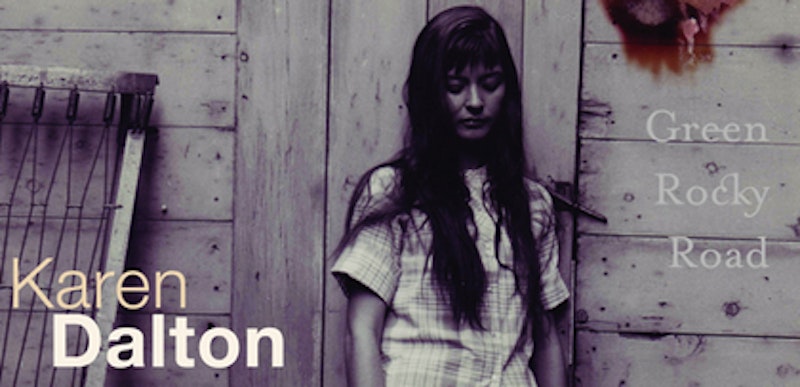Many things have been said of Karen Dalton. She was often tagged as "folk music's answer to Billie Holiday." Bob Dylan once described her as "funky, lanky, and sultry." And the late Fred Neil noted, "She sure can sing the shit out of the blues." But perhaps the truest thing to be said of Dalton is that she was never truly comfortable in her life. She arrived in New York City in the early 60s, leaving behind a husband and at least one child in Enid, Oklahoma. Her piercing beauty and long black hair made her an obvious fit in the Greenwich Village folk revival scene along with some of the guys quoted above. But many argued that Dalton was authentic country blues and not just an admirer—closer to Mississippi John Hurt than The Holy Modal Rounders. You could even say her career mirrored that of Townes Van Zandt, in that she was never commercially successful but received acclaim from both the genuine Appalachian musicians and more famous contract songwriters.
Dalton was especially uneasy in the studio. She was more or less tricked into recording her first album It's So Hard to Tell Who's Going to Love You the Best when Neil assured her that the tapes were not rolling. She had just as hard of a time recording her second album In My Own Time, and, after it failed to appeal to audiences, she became increasingly more isolated and self-destructive until her death in 1993. But, the legend of Karen Dalton has grown with each posthumous release of her work. And following in the footsteps of last year's Cotton Eyed Joe live sessions, Delmore Recordings is unveiling a new nine-track set that supposedly catches the late-great singer at her most comfortable and earnest.
Green Rocky Road finds Dalton deep in Appalachian country and blues. The album is just her on her banjo tackling folk standards. There is nothing slick or polished about the instrumentation and Dalton does indeed sound more tranquil than on most takes from Cotton Eyed Joe. Front and center is her bruised and willowy voice. Even after listening to her for years, her voice still manages to leave me breathless. Part of the appeal is Dalton’s excellent phrasing. Her drawl gives her words an authentic character without undermining her lyrics, and she conjures a profound sadness with her soft, hushed tone. It's difficult to tell whether she is personally damaged or simply appointing that mood to her song.
The title track is a cover song, but Dalton uses the occasion to reflect on her hitchhiking lifestyle, singing,
When I go to Baltimore/Need no carpet on my floor/Get your coat and follow me/I know a man in Galilee.
But further in, as she sings, "Green, green rocky road/Promenading green/Tell me who you love," her voice takes on a striking fragility. Her excitement for companionship turns into a plea for honesty.
Some of the songs on the album were also released on Cotton Eyed Joe but now find greater accessibility with the different production style. The traditional number "Katie Cruel" pushes Dalton's voice more up front, where before it sounded somewhat constrained and subdued. One of Dalton's most precious songs is her rendition of Leroy Carr's "In the Evening." The version found on Cotton Eyed Joe felt a bit too slow and overly meandering. But here, after some bizarre banter about dancing, Dalton unwinds the jazzy tune with excellent pacing, her falsettos and elongated stresses giving the song a stinging tenderness. While this version can't top the original recording from her debut album, it is better fit for a candle-lit evening.
Some other highlights from Green Rocky Road include the rollicking (if you can even call a Karen Dalton song rollicking) "Red Rockin' Chair." Over some more lively banjo picking, Dalton sings, "Can't make a living this way/Ain't got no honey baby now, oh no." "Skillet Good and Greasy" is also memorable, not just for its delightful title but also for its 1940s down home appeal à la Elizabeth Cotten.
While Delmore Recordings stresses that this release is a far more genuine and accurate account of what Karen Dalton sounded like in the 1960s, it doesn't exactly represent a composed Dalton. With accompanying artists or not, Dalton always sounds slightly tormented or damaged. In this instance, with just the bare bones of her banjo and a friend sitting alongside her, Green Rocky Road feels more intimate but no less perplexing. But then again, Dalton was always a complex figure—a strikingly beautiful woman with two missing front teeth, whose music only hinted at her shadowed life. Green Rocky Road doesn't reveal much more about her back-story, but it is an absolute gift of an album.
Selections from Green Rocky Road are available here, and a short documentary about Karen Dalton can be viewed here.

